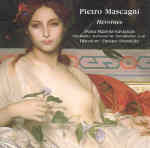Mascagni wrote 16 operas; 11 are represented here as is a 25-minute cantata he composed in 1898 to commemorate the centenary of the poet Giacomo Leopardi. This CD, since it offers much previously little-known/unrecorded material, should be a very valuable release, but I must be clear about one thing in large type, and here goes: CAVEAT EMPTOR. Actes Sud, normally pretty meticulous about its presentation, lets us down severely. There are no texts or translations, and the notes are close to useless. One essay discusses Mascagni’s career and each opera within its context, and the other vaguely discusses the selections. Very vaguely. Regarding an aria from the unknown Pinotta, we’re told that “the young Mascagni developed a bright tonal structure and simple but charming vocal lines”; and that an aria from Nerone is “tinged here and there with Puccinian harmonies”; and that the cantata “has a distinctly operatic flavor.” In short, the label has committed commercial suicide by cutting corners: this release could have been truly precious; instead it’s a bunch of interesting, well-performed music.
But it’s undeniably fascinating to hear so much Mascagni. You become familiar with his very chromatic writing as well as a few darned good melodies. You also realize that 110 minutes of soprano verismo arias is pretty strong stuff. The constant exclamation, the hard-driving climaxes, and the general sense of angst can overwhelm.
Among the “finds” is an eight-minute scena from Isabeau (a Lady Godiva-like story in which the heroine is forced to ride her horse naked through the streets) that shows itself to be not only beautiful and wonderfully expressive, but fascinating in the way that purely orchestral interludes alternate with sung portions, creating an odd combination of introspection and outward passion. (One of the interludes sounds exactly like the final notes of Andrew Lloyd Webber’s “Music of the Night” from Phantom of the Opera!).
Iris’ aria from the opera of the same name is familiar (Olivero, Scotto, and others) and ardently sung here; an aria from Zanetto is more tender; Le maschere is represented by an aria in which spoken words are set against an orchestral backdrop before any actual singing begins; and the somewhat well-known scene from Lodoletta, “Flammen, perdonami” (Mafalda Favero, among others, recorded it), is another beauty, and for the first time it’s recorded complete (14 minutes) within its context. Less successful is an aria from Nerone, the composer’s last work, and two arias from Guglielmo Ratcliff, which don’t seem to go anywhere.
The cantata to Leopardi is really unusual–it’s more like an orchestral work (nicely orchestrated, sometimes sounding like L’Amico Fritz) with occasional sung passages. A long excerpt from Parisina is unique–a harmonium underpins the vocal line, and it’s a simply beautiful (if rambling) scene. I wish I knew what most of the words, in most of the arias, mean: my relatively good opera-Italian only lets me understand very generalized information.
Denia Mazzola-Gavazzeni, with a voice more interesting than beautiful, is an ideal verismo singer. Her fast vibrato, particularly on loud, highish notes, adds excitement (though I can see it annoying some people). She has no fear of chest voice, and in fact seems to get stronger as the emotional temperature rises. Her total involvement, perfect diction, and understanding of the idiom are admirable. The accompaniments (a chorus is involved in a Parisina excerpt) and sound are first rate. Please remember the CAVEAT: this recording is dreadfully presented and therefore stabs itself in the foot.
































